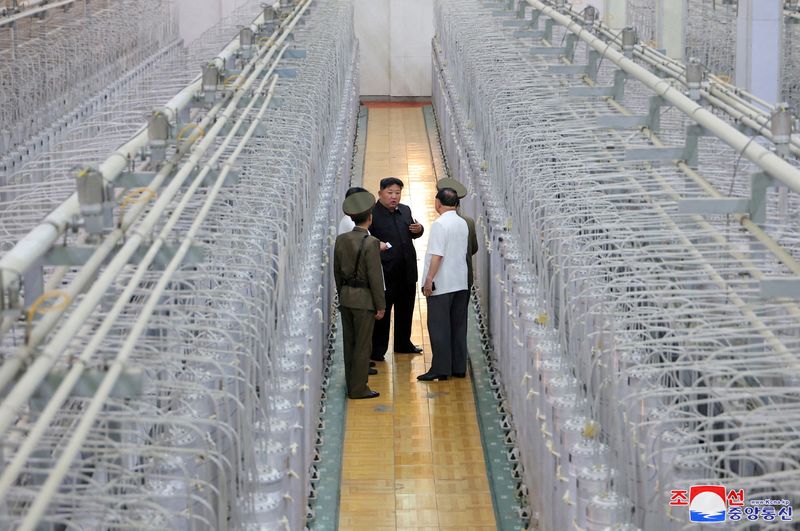By Hyunsu Yim and Josh Smith
SEOUL (Reuters) -North Korea for the first time showed images on Friday of the centrifuges that produce fuel for its nuclear bombs, as leader Kim Jong Un visited a uranium enrichment facility and called for more weapons-grade material to boost the arsenal.
The state media report on Kim's visit to the Nuclear Weapons Institute and a production base for weapon-grade nuclear materials was accompanied by the first photos of the centrifuges, providing a rare look inside North Korea's nuclear programme, which is banned under multiple United Nations Security Council resolutions.
The photos showed Kim walking between long rows of metal centrifuges, the machines that enrich uranium. The report did not make clear when the visit occurred nor the facility's location.
Kim urged workers to produce more materials for tactical nuclear weapons, saying the country's nuclear arsenal is vital for confronting threats from the United States and its allies.
The weapons are needed for "self-defence and the capability for a preemptive attack," he said.
The North Korean leader said "anti-DPRK nuclear threats" from the "U.S. imperialists-led vassal forces" have crossed the red-line, according to the report.
South Korea condemned North Korea's unveiling of its uranium enrichment facility and will never accept Pyongyang's possession of nuclear weapons, the South's unification ministry said.
White House national security spokesman John Kirby (NYSE:KEX) would not comment on the images. "I would simply say that we continue to monitor North Korean progression, both in their open their nuclear ambitions as well as their ballistic missile technology and program," Kirby told reporters.
North Korea is believed to have several sites for enriching uranium. Analysts say commercial satellite imagery has shown construction in recent years at the main Yongbyon Nuclear Scientific Research Center, including its uranium enrichment plant, suggesting possible expansion.
Uranium is a radioactive element that exists naturally. To make nuclear fuel, raw uranium undergoes processes that result in a material with an increased concentration of the isotope uranium-235.
International Atomic Energy Agency chief Rafael Grossi said on Monday that the U.N. nuclear watchdog had observed activity consistent with the operation of a reactor and the reported centrifuge enrichment facility at Yongbyon.
NEW CENTRIFUGES
Kim stressed the need to boost the number of centrifuges so as to "exponentially increase" North Korea's nuclear arsenal, and expand the use of a new type of centrifuge to strengthen the production of weapon-grade nuclear materials.
The centrifuges seen in the photos appear smaller and shorter than the types previously believed to be used by North Korea, suggesting it had developed its own centrifuges to enhance separation capabilities, said Lee Sang-kyu, a nuclear engineering expert at South Korea's Korea Institute for Defense Analysis.
The photos also confirmed that the North is using a cascade system where large numbers of centrifuges are interconnected to achieve highly enriched uranium, he added.
The new type of centrifuge shows North Korea is advancing its fuel cycle capabilities, said Ankit Panda of the U.S.-based Carnegie Endowment for International Peace.
"Kim also appears to suggest that North Korean tactical nuclear weapons designs may primarily rely on uranium for their cores," he said.
This is notable because North Korea is more able to scale up its highly enriched uranium stockpiles, Panda said, compared to the more complicated process for plutonium.
'INCREASING ARSENALS'
North Korea invited some foreign scientists to view a centrifuge facility at Yongbyon in 2010, but Jenny Town of the U.S.-based Stimson Center said Friday's report is the first and only photographs of the equipment.
"It shows how advanced their enrichment capability has become, which gives greater credibility to both their ability and commitment to increasing their nuclear weapons arsenals," she said.
It could also be meant to influence the U.S. election and send a message to the next administration that denuclearisation is no longer possible and it should recognise North Korea as a nuclear state, said Hong Min, a senior researcher at the Korea Institute for National Unification in Seoul.
On Friday, top Russian security official Sergei Shoigu met Kim in North Korea and discussed bilateral and international issues, Russia's Interfax news agency reported.
The meeting is the latest high-level exchange between the two states amid deepening military cooperation. Pyongyang continues to supply weapons to Russia, according to analysts, including brand new ballistic missiles produced this year.
KCNA said in a separate report Kim oversaw the test launch of a new 600mm multiple launch rocket system on Thursday, which a South Korean official said earlier may have been to test the weapons for export to Russia.

North Korea has conducted six underground nuclear tests between 2006 and 2017, and has previously shown photos of what it says were nuclear warheads.
Estimates of the number of North Korean nuclear weapons varies widely. In July a report by the Federation of American Scientists concluded that the country may have produced enough fissile material to build up to 90 nuclear warheads, but that it has likely assembled closer to 50.
